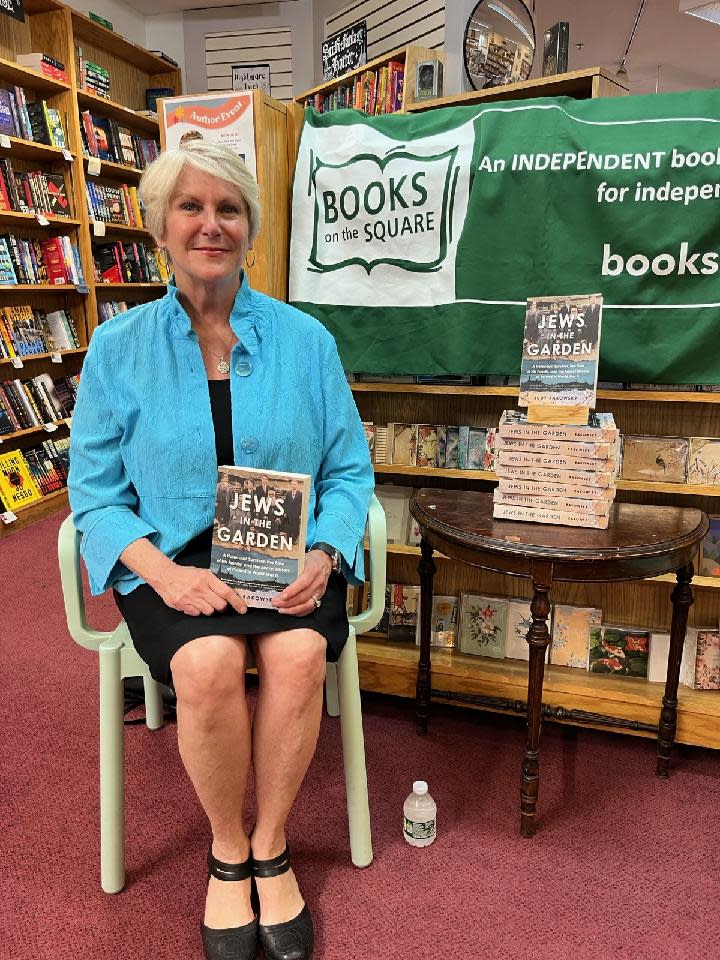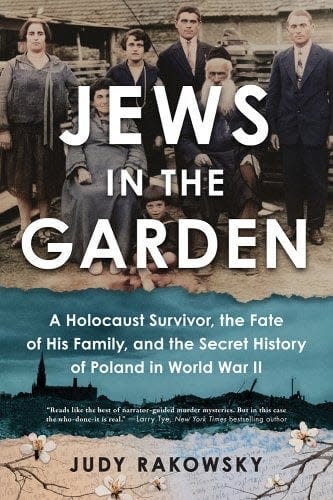What really happened to ex-Journal writer's family in WWII? It's a Holocaust murder-mystery
Judy Rakowsky, a former journalist for The Providence Journal and The Boston Globe, recalls hearing author and Holocaust survivor Elie Wiesel speak at Temple Beth-El in Providence. “Listen to the survivors,” Wiesel said. When you listen to the witnesses, he said, you become a witness yourself.
Rakowsky has a survivor in her own family, her father’s cousin Sam (Rakowski) Ron, who has a remarkable tale of grit, endurance and luck. Rakowsky wrote about Sam in the Providence Journal Sunday magazine in 1987. When Sam went to Poland in 1991, Rakowsky went along. She’s been back multiple times since.
The two found an odd mixture of warmth, engrained antisemitism, and a willful indifference to much of what happened during the war. And they also chased a still-unsolved mystery.
More: Mandy and Mark Patinkin discover family's terrible fate during Holocaust

What is the book 'Jews in the Garden' about?
Rakowsky has written a book about her experiences in Poland, called “Jews in the Garden.” The title has a double meaning. The phrase came from a woman whose grandfather tried to hide Jews during World War II. She was teased by friends, who told her there were Jewish bodies buried in the garden. Rakowsky also points out that Poland itself was a “garden” for Jews in the Middle Ages, when Polish kings welcomed Jews and granted them civil rights.
Rakowsky said Sam came alive when he was on his home turf.
“I can hardly describe how delighted he was to be there,” she said. Sam was not blind to Polish antisemitism, she said, but he also remembered every Polish kindness and act of bravery in defense of Jews. He pointed out that there are more Poles listed as “Righteous Among the Nations” by Israel’s Yad Vashem World Holocaust Remembrance Center than any other nationality.
In Poland, Sam had gotten word that a relative, Hena, who had been in hiding, might have escaped the massacre that killed the rest of the family. Rakowsky used her reportorial skills in an effort to track down Hena, with the goal of reuniting her and Sam in Poland. So far, that hasn’t happened.
More: 'How to be an anti-racist,' book bans and how America could teach about race in schools

Polish complicity in the Holocaust a sensitive subject
Meanwhile, it emerged that Hena’s family was killed not by Germans, but by Polish partisans. That was not all that uncommon, Rakowsky said. The Polish underground was large and diverse and included many factions. Some were extremely antisemitic and did not want any Jews left in the country.
To talk about this is a third rail of Polish culture. When questioned by the Rakowskys, Poles would respond “Nie wiem,” which means “I don’t know.” (One time, Rakowsky was chased by an angry farmer with a pitchfork when she tried to take pictures.)
'Back there again': She fled Nazis in 1939 near Ukraine and sees a replay in Putin's war
The official government line is that all Poles helped Jews. After the right-wing Law and Justice Party came to power in 2015, it passed a 2018 law making it a criminal offense to suggest any Polish complicity in the Holocaust.
On Tuesday, USA TODAY ran an opinion piece by Rakowsky comparing the Polish government’s effort to create a positive history of its country with efforts by some in this country, such as former President Donald Trump’s 1776 Commission, to call for a pro-American school curriculum.
In September, Rakowsky will return to Poland. Sam, about to be 99, will not be going along. But he’s being honored in his hometown of Kazimierza Wielka, and Rakowsky is going to represent him. She’s also bringing along copies of her book. It hasn’t been translated into Polish, she said, but many Poles know English.
What will they think?
“I don’t know,” Rakowsky said. “I just hope they can appreciate the effort that went into it.”
This article originally appeared on The Providence Journal: New book is a Holocaust murder-mystery by former Journal writer

